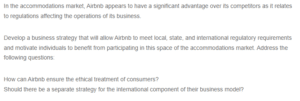Airbnb Case Study Analysis
Ensuring the Ethical Treatment of Consumers
Ethical treatment of consumers is vital in enhancing business sustainability and performance. One of the things that Airbnb can do to ensure the ethical treatment of consumers is to develop an ethical code of conduct and lead by example to ensure that the staff understands that ethics is a strategic priority. The ethics code should clearly indicate the expected behavior and the consequences for not acting ethically, such as fines and employment contract termination. Leading by example can include holding meetings with staff to discuss ethical practices within the business operations, potential ethical issues that could emerge, and the best approach to address the issues. Airbnb can also ensure the ethical treatment of consumers by training employees on ethical practices and the risks of ethical issues.
The training should also include laws and regulations linked to ethical practices to emphasize the need for ethical practices and upholding integrity. Airbnb should also create a procedure for reporting unethical behavior to ensure that unethical practices are addressed before they adversely impact business operations. The reporting procedure should consider anonymous reporting to encourage employees to report. It should also make it easy for staff to report unethical behavior through multiple communication channels. Airbnb can also ensure the ethical treatment of customers by rewarding staff who behave ethically. The reward program should be communicated to all staff to motivate them to behave ethically.
A Separate Strategy for the International Component of the Airbnb Business Model
According to von Briel & Dolnicar (2021), Airbnb use a multi-sided platform model which connects guests needing short-term accommodation and hosts with space to rent out for a short time. The relationship between the guests and hosts creates a sharing economy hence the need for laws and regulations to sustain a good relationship. A sharing economy includes a two-way consumption where individuals can borrow or rent goods from sellers instead of purchasing them. Airbnb advertises itself on different platforms and allows customers to book the available room or house for reservation. Therefore, there should be a separate strategy for the international component of their business model to accommodate the business laws and regulations in different countries and protect customers from losing their money.
Nieuwland & Van Melik (2018) argue that the regulatory approaches that can be considered in regulating Airbnb operations include laissez-faire, prohibition, and allowing business operations with specific restrictions. The international component of the Airbnb business model should consider whether the regulations of the regions where Airbnb is located prohibit operations, embrace the laissez-faire approach, or allow operations with specific restrictions. The most important regulations that should be considered in the international component of the Airbnb business model are tax regulations and the regulations used to enhance guest safety.
In some countries, hosts have to self-declare compliance with installing safety devices such as fire extinguishers, safety alarms, and building regulations. Hosts may also be required to have public liability insurance. Airbnb also needs to consider laws and regulations restricting the number of days it can host guests. Some countries prohibit hosts from hosting guests for a short time due to administrative and city zoning codes. Hosts may also be required to register their Airbnb businesses and obtain a license or permit before they can list their property as an Airbnb and start hosting guests. Penalties may be imposed on hosts who host guests for a longer time than what is indicated in their permit or business hence the need for Airbnb to adjust operations based on laws and regulations in their business environment.
References
Nieuwland, S., & Van Melik, R. (2018). Regulating Airbnb: How cities deal with perceived negative externalities of short-term rentals. Current Issues in Tourism, 23(7), 811-825. https://doi.org/10.1080/13683500.2018.1504899
von Briel, D., & Dolnicar, S. (2021) .The evolution of Airbnb regulations, in S. Dolnicar (Ed.) Airbnb before, during and after COVID-19, University of Queensland DOI: https://doi.org/10.6084/m9.figshare.14195972
ORDER A PLAGIARISM-FREE PAPER HERE
We’ll write everything from scratch
Question
In the accommodations market, Airbnb appears to have a significant advantage over its competitors as it relates to regulations affecting the operations of its business.

Airbnb Case Study Analysis
Develop a business strategy that will allow Airbnb to meet local, state, and international regulatory requirements and motivate individuals to benefit from participating in this space of the accommodations market. Address the following questions:
How can Airbnb ensure the ethical treatment of consumers?
Should there be a separate strategy for the international component of their business model?

